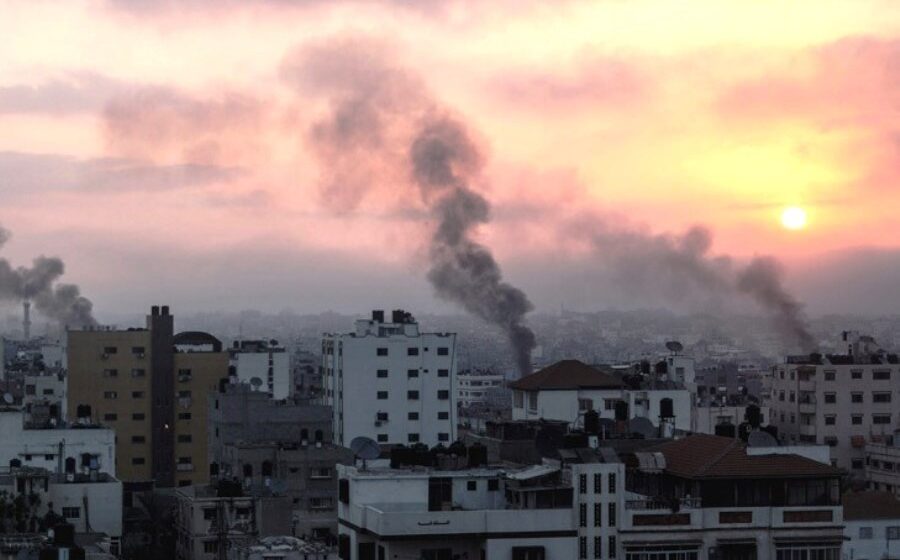Israeli warplanes have launched what appeared to be the heaviest airstrikes yet on Gaza City, hours after the Israeli prime minister, Benjamin Netanyahu, signalled the bombardment would rage on.
The series of attacks early on Monday rocked the city from north to south for 10 minutes and was more intense, covered a broader area and lasted longer than the raids 24 hours earlier in which 42 Palestinians were killed – the deadliest single attack in the latest violence between Israel and the Hamas militant group that rules Gaza.
Local media reports said the main coastal road west of the city, security compounds and open spaces were among the targets hit early on Monday. The power distribution company said the airstrikes damaged a line feeding electricity from the only power plant to large parts of southern Gaza City. There were no immediate reports of injuries.
The Israeli army spokesperson’s office said the strikes targeted Hamas’s “underground military infrastructure”. As a result of the strike, “the underground facility collapsed, causing the civilian houses’ foundations above them to collapse as well, leading to unintended casualties”, it said.
On Sunday, air-raid sirens sounded for the seventh consecutive day across southern Israel as Hamas and other militant groups in Gaza launched more rocket attacks into the country – and reaching further – than in the entirety of the 2014 war.
As the UN security council met in a specially convened session, foreign ministers and ambassadors called for a ceasefire and for both sides to respect international humanitarian law, but there was no sign of even a temporary truce to allow medics in Gaza to recover people – alive and dead – from under collapsed buildings.
The UN secretary general, António Guterres, said the Israeli-Palestinian conflict was heading for an “uncontainable security and humanitarian crisis”.
“The fighting risks dragging Israelis and Palestinians into a spiral of violence with devastating consequences for both communities and for the entire region,” Guterres told the UN security council on Sunday. “It has the potential to unleash an uncontainable security and humanitarian crisis and to further foster extremism, not only in the occupied Palestinian territory and Israel, but in the region as a whole.”
After speaking with Egypt’s foreign minister, the US secretary of state, Antony Blinken, wrote on Twitter that “all parties need to deescalate tensions – the violence must end immediately”.
In a televised address, Netanyahu said Israel’s attacks were continuing at “full force” and would “take time”. Israel “wants to levy a heavy price” on the Hamas militant group, he said, flanked by his defence minister and political rival, Benny Gantz, in a show of unity.
Hamas also pressed on, launching rockets from civilian areas in Gaza towards civilian areas in Israel. One hit a synagogue in the southern city of Ashkelon hours before evening services for the Jewish holiday of Shavuot, Israeli emergency services said. No injuries were reported.
Hostilities have repeatedly escalated over the past week, marking the worst fighting in the territory that is home to 2 million Palestinians since the devastating 2014 war between Israel and Hamas.
The latest outbreak of violence began in East Jerusalem last month, when Palestinians clashed with police in response to Israeli police tactics during Ramadan and the threatened eviction of dozens of Palestinian families by Jewish settlers. A focus of the clashes was al-Aqsa mosque, a frequent flashpoint located on a hilltop compound revered by both Muslims and Jews.
Hamas began firing rockets toward Jerusalem on Monday, triggering the Israeli assault on Gaza.
At least 188 Palestinians have been killed in hundreds of airstrikes in Gaza, including 55 children and 33 women, with 1,230 people wounded. Ten people in Israel have been killed in some of the 3,100 rocket attacks launched from Gaza, including a five-year-old boy and a soldier.
Hamas and the Islamic Jihad militant group have acknowledged 20 fighters killed in the fighting. Israel says the real number is far higher and has released the names and photos of two dozen alleged operatives it says were “eliminated”.
The assault has displaced about 34,000 Palestinians from their homes, the UN Middle East envoy, Tor Wennesland, told an emergency meeting of the UN security council, where eight foreign ministers spoke about the conflict.
Efforts by China, Norway and Tunisia to get the UN body to issue a statement, including a call for the cessation of hostilities, have been blocked by the US, which, according to diplomats, is concerned it could interfere with diplomatic efforts to stop the violence.
The Palestinian foreign minister, Riyad al-Maliki, urged the security council to take action to end Israeli attacks. Israel’s UN ambassador, Gilad Erdan, urged the council to condemn Hamas’s “indiscriminate and unprovoked attacks”.



